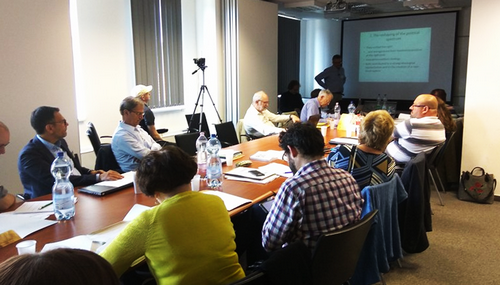What can the elite do during crises? A conference on “Elites in Crisis”

Should one feel guilty if they see themselves as members of the elite? Is belonging to the elite an advantage or a disadvantage in terms of social responsibility? What can the elite do in times of crisis? How can thisaffect the behaviour and circumstances of other members of society? On 19 and 20 May 2017, a two-day English-language conference was held at Corvinus University of Budapest on “Elites in Crisis”. The main organizers were Dr. Lilla Tóth and Dr. György Lengyel (of the Centre for Empirical Social Research of the Institute of Sociology and Social Policy). At the conference, works by university teachers and researchers specialized on elite research were presented. On both days, participants presented their research results and discussed the latest developments in elite research in three panels.
On 18 May, the day before the conference, Max Haller, Professor Emeritus of the University of Graz gave a lecture at Corvinus University. In his lecture “Objective and subjective trends based on findings from the International Social Survey Programme (ISSP)”, he pointed out that economic inequality has been increasing in several countries. He argued that this increase is not – as claimed by many authors – universal and not attributable only to the rise of neoliberalism. Other factors – political institutions and attitudes, changes in ethnic heterogeneity, socio-economic development – also played a quite important role. At the same time, Max Haller added, there is no one-to-one correlation between objective inequality and its subjective perception. He first presented the recent changes in economic inequality around the world and the way inequality is perceived. Then, in more detail, he examined the relations between objective inequalities and their subjective perception in two categories of countries – the post-Communist countries in Central Eastern Europe and Asia, and the German-speaking Central European countries (Austria, Germany and Switzerland) – with latent class analysis and multivariate analyses. Results show that populations of different countries perceive inequalities in different ways. Beside the individual’s class position, it is the changes in inequality and the differences between countries that matter rather than the level of inequality itself.
A primary objective of the conference of 19 and 20 May was to map the crises (above all, the global economic crisis and its consequences and repercussions) that hit all segments of the elite equally. As one of the speakers, John Higley, professor of the University of Texas summarized, the global financial crisis of 2008-2009 was the starting point of a crisis situation to which the elites failed to respond efficiently, as they stuck to austerity measures which prolonged the crisis. Since then, economic growth has been weak, while unemployment and underemployment have been on the rise. Massive migration to Western countries also worsened the crisis, although it was not brought about by these global financial problems only. Yet another consequence of the crisis was that confidence in political institutions was shaken, which, in turn, increased the distance between the elites and other citizens. Nicolò Conti, professor of the Unitelma Sapienza University of Rome compared the data of ten member states of the European Union, investigating how the national elites perceive the EU and to what extent they trust its institutions. Results show that although the opinion of citizens and the media reflect that Euroscepticism is gaining ground, the elites – in a different manner in each country – do trust and support EU institutions. The major supporters of the integration of the European Union are the Southern states and Germany.
György Lengyel, professor of Corvinus University and Laura Szabó from the Demographic Research Institute of the Hungarian Central Statistical Office shed light on the political elite’s trust in the Union. Their presentation, above all, called attention to a most interesting correlation: that in all member states included in the survey, the elite’s trust in the European Parliament has grown, whereas in Hungary in the period from 2007 to 2014 it weakened, and, what is more – as opposed to the facts reflected by the data of other countries – the rest of the population trusts the European Parliament more than the political elite does.
Borbála Göncz from Corvinus University spoke about the changes that occurred in the relations of the national political elite to the European Union as a supranational organization. During the time of the crisis, the elite’s attitude remained stable. On the whole, the change in opinion occurred as a result of the strengthening presence of newcomers (quite often, extremist or populist parties) in the Parliament.
Luca Kristóf, department member of the Centre for Social Sciences of the Hungarian Academy of Sciences conducts research in the field of the elites and the sociology of highly educated intellectuals. Using the example of theatres and theatre directors, she pointed out that the influence of the governing elite on other elite groups has been growing recently, and the political elite is redistributing cultural positions and resources. The discussion of culture as an area under survey added a new aspect to the discourse.
The conference also touched upon, among others, the Norwegian model as a good example and the elites’ contribution to the operation of the welfare state, and the crisis of democracy (seen from the perspective of the decline of participation rates, the rise of populist parties and leaders, and the new social media where information and propaganda merge). The issue of interests and conflicts of interest of the various segments of the elite was also discussed.
The conference offered the best experts an opportunity to meet and, based on their shared knowledge, discuss theprocesses in various countries that are related to or may stem from the behaviour of the elites. The speakers, investigating the issue from an international and a Hungarian point of view, argued that researching the elite and understanding its behaviour are important tasks for social scientists, as the elite is in position to influence or even modify economic and social processes.
Borbála Szczuka
